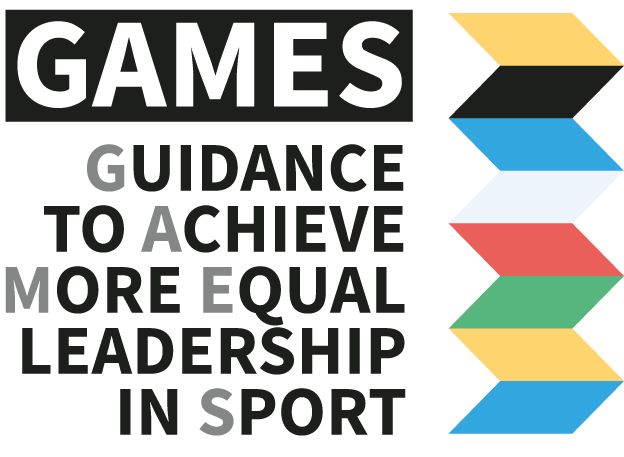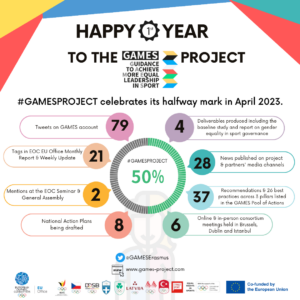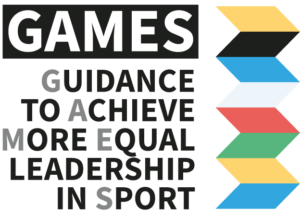The GAMES project (Guidance to Achieve More Equal leadership in Sport) is a 24-month project co-funded by the European Union's Erasmus+ Sport Programme 2021 with the aim to promote structural and cultural changes regarding gender equality in leadership and decision-making positions among National Olympic Committee (NOCs) and their member federations (i.e National Federations – NFs).
The EOC EU Office is the coordinator of the GAMES project which also involves 8 European NOCs (Belgium, Czech Republic, Germany, Greece, Ireland, Latvia, North Macedonia and Turkey) and renowned experts in the field of gender equality and good governance, including Professor Emerita Kari Fasting from Equal Rights in Sports and I TRUST Sport. Besides, the GAMES project is supported by the International Olympic Committee.
In April 2023, the GAMES project celebrates its halfway mark whilst 4 deliverables were produced in 12 months, among which:
The questionnaire to assess gender equality reviewed the situation in terms of gender equality at the leadership level among partners NOCs and a set of major NFs representing winter/summer sports and individual/team sports. Accordingly, it addressed a enquires on the organisational structure, the current policies and procedures for gender equality and representation, as well as the socio-cultural context, the role of sport within the country and the main barriers to gender equality. Overall, the questionnaire has gathered responses from 110 NFs across 8 European countries (Belgium, Czech Republic, Germany, Greece, Ireland, Latvia, North Macedonia and Turkey) with a productive response rate of 89%.
The State of Arts Report provided an analysis of the baseline questionnaire in terms of women’s representation at the leadership level within partner NOCs and NFs. Hence, it showed that 25% of NOCs and 42% of NFs surveyed had a gender equality or diversity and inclusion policy/strategy whilst quite a number were currently seeking to develop one. Notwithstanding, women appeared to be less represented in decision-making, senior management and executive roles currently. Yet the most widely adopted initiatives to help women reach decision-making positions among both NOCs and NFs included networks, mentoring and education programmes, as well as workshops/seminars for women in decision-making positions. Nevertheless, considerable caution is needed before attempting to extrapolate numbers and trends more widely.
Currently, the GAMES consortium is working on the Pool of Actions, as well as the NOCs’ National Action Plans.
NOCs’ National Actions Plans will be a strategic document approved by the NOC’s leadership including the NOC’s vision and concrete actions to reach set objectives to improve gender equality in the leadership within a set timeframe. Notably, the NOCs’ National Action Plans are expected to be informed by the results that emerged from the report of the baseline study, as well as by the Pool of Actions.
GAMES Pool of Actions will be a manual of concrete actions to European NOCs – and sport organisations at all levels - to strengthen gender equality in leadership positions whilst considering the organisation’s current “stage of readiness”, political and socio-cultural barriers existing. This is fully aligned with the EOC’s Gender Equality and Inclusion Commission, the IOC’s Gender Equality and Inclusion Strategic Framework 2021-2024 and the EU Gender Equality Strategy 2020-2025




